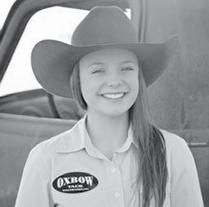
4 minute read
REGION I
806-433-7382 • tjohnsoncattle@gmail.com
RANDY MARTIN
Advertisement
PO Box 334 • Vega, Texas 79092 806-670-2113 • randyleemartin@hotm
806.674.1397 • david.christian@11ranch.com
SECRETARY - BRANDY WRIGHT
11555 US HWY 83 • Canadian, Texas 79014 806.255.0034 • tristaterodeo@yahoo.com
STUDENT OFFICERS PRESIDENT - WYATT MASK VICE PRESIDENT- JAYDA JAMESON SECRETARY/HISTORIAN - RIDLEY TIMBERLAKE
STATE DIRECTORS / REGION OFFICERS DAVID CHRISTIAN
10200 S Blessen Rd • Amarillo, TX 79119 806.674.1397 • david.christian@11ranch.com
PERFORMANCE REPORT
By TAYLN WRIGHT – Performance Reporter
Moving into the 2nd half of our 20202021 season, most of us are just looking forward to getting to rodeo again and the possibility of making it to state finals in Abilene. However, our seniors have much more to be focused on. They are busy filling out scholarship applications, visiting prospective colleges, and preparing for the next chapter of their rodeo career if they choose to pursue it. As they get ready to embark on their new adventures, I asked Emery Mask, former Region 1 Reporter, for some words of wisdom to help them prepare for this transition from the High School ranks to College.
Emery Mask is currently attending South Plains College working on an Associate’s degree in Agricultural Communications. Emery grew up in the rodeo atmosphere, with her mother being a horse trainer as well as a barrel racer and her father being a bull rider. She has always liked horses, but didn’t get serious about rodeo until the end of her sophomore year when she started riding her main horse, Ferrari. At this time, Emery knew rodeoing was what she was meant to do. She followed her dream into the next stages and is now chasing her first CNFR, and she would like to pass on to the future freshman some of the things she has learned on this journey and what to expect next year.
College rodeo is somewhat different than High School, not only do you have individual points, but there are also team points. Your rodeo coach will choose 4 girls and 6 boys, for a total of 10, to compete for your College as a team over the 3 days of rodeo. In those 3 days there will be several performances, including slack, and a short go. You will accumulate points as an individual if you place in an event and gain points for the team if you are talented enough to get picked. At the end of the year, the #1 men’s and the #1 women’s team will have to ability to send contestants to Nationals. As for the individual competition, points are collected throughout the year and at the end of the season, the top 3 from each event is sent to nationals.
When starting college rodeo, expect to be the low man on the totem pole. Don’t be cocky and think you’re just going to go in and dominate because you were successful in high school. As a rookie you have to earn others respect through hard work and commitment to the program. This kind of dedication will eventually payoff in the arena. College rodeoing is completely different from THSRA, because you are the adult, and you must be responsible and take care of business, mom and dad are no longer there to do it for you. Self-discipline is extremely important for success in college. Competition at the collegiate level is also much more challenging. One could potentially be contending against participants that have their permits and are going professionally already. The number of actual contestants also contributes to steeper competition. Instead of there only being 5-10 tough kids in each event like at a Region rodeo of High School, there are about 20-30, if not more, that can win at any given time at a college rodeo. You are also competing against champions from all over, that have past experiences and know what it takes to win.
When choosing a college to rodeo for, one of the most important things to consider is getting along with your soon to be coach. Your relationship with your coach is a huge part of college rodeo. Don’t just choose a college because that’s where “the best” attend. Not being able to get along with your coach can hinder the opportunities you may have to do well. After that be sure and attend one of the college practices at the school you are looking at to make sure it aligns with what you accustom to. Also, be sure and consider the events that school concentrates on, for example you don’t want to be a team roper going to a school that is more focused on rough stock.
For Region 1 seniors, Emery has some words of advice about college. “Don’t stress out over picking the perfect school or making sure that everything is perfect, because everything will fall into place the way it’s meant to be. Just enjoy the last bits of your high school rodeo career and do great things!”







